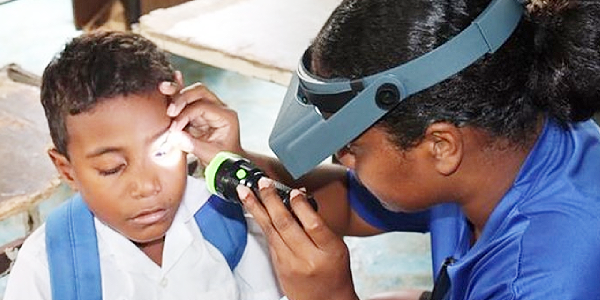A WEEKLONG Trachoma awareness carried out by the Ministry of Health and Medical Services (MHMS) in the Central Islands Province (CIP) is underway.
The awareness includes talks on trachoma as well as the conducting of screening and treating of the disease, targeting children from ages five to nine.
The awareness programme known as “School Trachoma F&E (Facial Cleanliness and Environmental Improvement) focusses on providing information to children to have the knowledge on the importance of personal hygiene, particularly keeping the face clean.
MHMS said in a statement that this programme actually started in the province in 2019 with community profiling which saw the collection of information on water, sanitation as well as assessing school children’s behaviours and practices on the use of water and sanitation.
“Trachoma, a bacterial infection that affects the eyes, is a common infectious cause of blindness and is endemic in Solomon Islands. Lack of personal hygiene, particularly dirty face, is the common risk factor, whilst environmental health factors such as lack of water and poor sanitation are the risk factors responsible for the spread of the disease,” MHMS said.
“Central Islands Province is one of the four provinces that have been identified as having higher prevalence of Trachoma. The other three provinces are Guadalcanal, Choiseul and Western Provinces.
As such, the MHMS Neglected Tropical Diseases (NTD) programme is rolling out this activity as part of its efforts against Trachoma,” it added.
MHMS said a team of two from the National NTD programme arrived in CIP on Monday and teamed up with the province’s Trachoma Focal Point team and together they are conducting the awareness and screening in the schools for operational convenience and where it will be easy to reach the targeted age group of children.
“Upon arrival, the team met with the province’s Education Authority and Head Teachers of the four (targeted) schools. In the meeting the EA and Head Teachers were briefed that the visit is a continuation of previous visits to continue to provide support to those schools with the aim of changing children’s practice on facial cleanliness.
“On Tuesday 14th March, the team conducted meetings with teachers and continued with the awareness and screening in McMahon Primary School. On Wednesday (yesterday), they did the same at Marvin Primary School and will do so today at Silas Primary School. Tomorrow, Friday, they will visit the Halavo Primary School,” MHMS said.
MHMS said preparations were also made this week to roll out similar activities in the other priority provinces and this will be followed by deployment of personnel from the National NTD Unit to support the roll out.
Head of the NTD Unit, Oliver Sokana said supporting children to change behaviour in personal hygiene has a crosscutting benefit and is therefore seen as an important strategy for the trachoma programme.
“Allowing children to come forward to be screened for Trachoma is key part of the strategy to help us understand if the disease is reduced,” he added.
Mr Sokana urged parents and guardians to encourage their children to practice constant face-washing with clean water and soap after school or play.
“Unlike other diseases, signs and symptoms of trachoma are not easily seen. Checking the eyes is the only way to know if someone has trachoma,” he said.
Mr Sokana said nevertheless the good news is that the early it is detected, the higher chance that it can be cured through an effective treatment regime.
He said the National NTD programme will continue to work with the Ministry of Education and Human Resource Development through respective education authorities to ensure information on trachoma is part of normal educational programmes.
Initiating integration with key stakeholders such as RWASH (Rural Water & Sanitation and Hygiene) is the focus of the programme in addressing trachoma elimination in Solomon Islands. This is a key strategy as water access and improved sanitation are key elements of achieving elimination of trachoma.
By FLOYD TERRY
Solomon Star, Honiara









